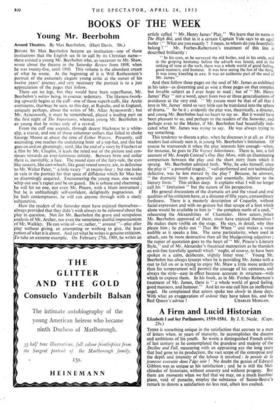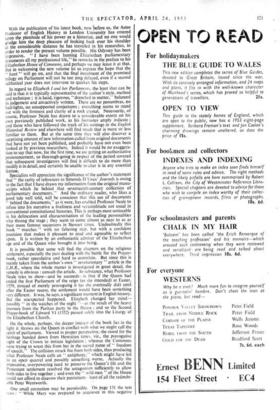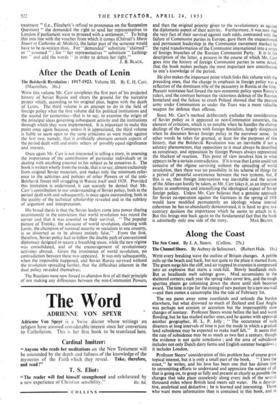A Firm and Lucid Historian
Elizabeth I and her Parliaments, 1559-1581. By J. E. Neale. (Cape. 25s.) THERE is something unique in the satisfaction that accrues to a man of letters when, in years of maturity, he accomplishes the dreams and ambitions of his youth. So wrote a distinguished French critic of last century as he contemplated the grandeur and majesty of the Decline and Fall, measuring with an appraising eye the long years that had gone to its production, the vast scope of the enterprise and the depth and intensity of the labour it involved : la pensee de la jeunesse executie dans Pike mar ! No doubt the genius of Edward Gibbon was as unique as his satisfaction ; and he is still the Mel- chisedec of historians, without ancestry and without progeny. But there are moments when we feel that we may, on a much humbler plane, void of panache, employ the substance of Sainte-Beuve's remark to denote a satisfaction no less real, albeit less exalted. With the publication of his latest book, now *before us, the Astor Professor of English History in London University has entered upon the plenitude of his power as a historian, and no one would grudge him the deep pleasure of looking back over his shoulder at the considerable distance he has travelled in his researches, in order to render the present volume possible. His Odyssey has been impressive. " I have been hunting Elizabethan parliamentary documents all my professional life," he remarks in the preface to his Elizabethan House of Commons, and perhaps we may leave it at that. But in welcoming the new volume let us express the hope that the " hunt " will gq on, and that the final instalment of the promised trilogy on Parliament will not be too long delayed, even if a second sabbatical year does not intervene to quicken his steps.
In regard to Elizabeth I and her Parliaments, the least that can be said is that it is typically representative of the author's style, method and technique ; it is lucid, rigorous, "drenched in matter," balanced in judgement and attractively written. There are no penumbras, no half-lights, no unsupported conjectures ; everything seems to stand out with the firmness and clarity of a rock crystal. Necessarily, of course, Professor Neale has drawn to a considerable extent on his own previously published work, as his footnotes amply indicate ; and those who have followed the track of his writings in the English Historical Review and elsewhere will find much that is more or less familiar to them. But at the same time they will also discover a surprising amount of new information culled from original documents that have not yet been published, and probably have not even been looked at by previous researchers. Indeed it would be no exaggera- tion to say that now, for the first time, we are getting an authoritative pronouncement, so thorough-going in respect of the period covered that subsequent investigators will find it difficult to do more than modify it in detail, and certainly be unable to alter it in any essential teatime.
Specialists will appreciate the significance of the author's statement that " the rarity of references to Simonds D 'Ewes' Journals is owing to the fact that I have drawn my information from the original manu- scripts which lie behind that seventeenth-century collection of parliamentary documents." And the ordinary reader, who likes a good tale well told, will be conscious that this use of documents " behind the documents," as it were, has enabled Professor Neale to infuse into his narrative a liveliness and verisimilitude not usual in conventional constitutional histories. This is perhaps most noticeable in his delineation and characterisation of the leading personalities who throng the stage ; they seem to come almost as near to us as their more famous successors in Stewart times. Undoubtedly this book " marches " with no faltering step, but with a confident precision that makes it pleasant to read and agreeable to reflect upon. It is written by an enthusiastic admirer of the Elizabethan age and of the Queen who brought it into being.
It is possible that some will find the chapters on the religious settlement, especially the part dealing with the battle for the Prayer- book, rather speculative and hard to assimilate. But since this is mainly taken from the author's own " revolutionary " article in the E.H.R., where the whole matter is investigated in great detail, the remedy is obvious : consult the article. In substance, what Professor Neale tries to show—and he succeeds—is that if the Queen had ended the first Parliament of the reign (as she intended) at Easter, 1559, instead of merely proroguing it (as she eventually did) until after the Easter recess, the settlement would have been something very different. It was, he says, a significant moment in English history. But the unexpected happened. Elizabeth changed her mind— possibly " in the watches of the night "—as the result of the heavy pressure from the Puritan party in the House ; and so the Second Prayer-book of Edward VI (1552) passed safely into the Liturgy of the Elizabethan Church.
On the whole, perhaps, the deeper interest of the book lies in the light it throws on the Queen in conflict with what we might call the spirit of parliament. Viewed in proper perspective, she stood for the heritage handed down from Henrician times, viz., the prerogative right of the Crown to initiate legislation ; whereas the Commons were trying to wrest this from her in the sacred name of " freedom of speech." The collision struck fire from both sides, thus producing what Professor Neale calls an " antiphony," which might have led to an open quarrel and possibly something worse. Actually the Imperative, overpowering need to preserve the Queen's life and the Protestant settlement resolved the antagonism sufficiently to allow both sides to live together ; and even the " wild men " of the House could not afford to disavow their patriotism—least of all the redoubt- able Peter Wentworth.
One small correction may be permissible. On page 131 the text runs : " While Mary was prepared to acquiesce in this negative treatment " (i.e., Elizabeth's refusal to pronounce on the Succession Question) " she demanded the right to send her representatives to London if parliament were to proceed with a settlement." To bring this into line with the voucher from which it comes (Cheruel's Marie Stuart et Catherine de Medicis), the latter part of the sentence would have to be re-written thus. For "demanded" substitute "claimed" or " assumed " ; for " her representatives " substitute " Lething- ton " and add the words " in order to debate her right."
J. B. BLACK.




































 Previous page
Previous page